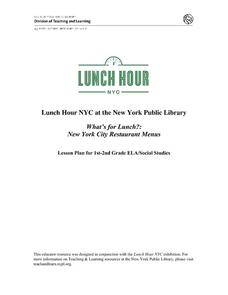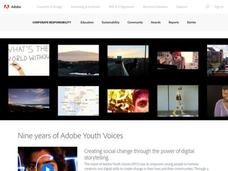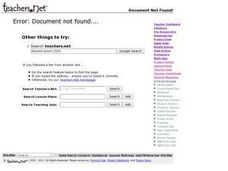Annenberg Foundation
America's History in the Making: Using Digital Technologies
How can digital technology of today link us to the events of the past? Scholars use technology to uncover the vast number of historical resources available in lesson 12 of a 22-part America's History in the Making series. Using databases...
Curated OER
Food Advertising Tricks
Students recognize techniques used to make food look appealing on television and in advertising, and explore the separate elements that compose media messages and products.
New York Public Library
What's for Lunch?: New York City Restaurant Menus
Do you remember the days when a cup of coffee cost five cents? At A.W. Dennett restaurant in 1894, you could buy a five-cent cup of coffee and as well as a five-cent slice of pie to accompany it. The menu from that year is a primary...
Curated OER
The Internet of Things: IoT
How has the Internet of Things affected our lives? Scholars examine the massive influence of mobile devices in this analysis lesson, which begins with a seven-minute documentary clip. They also read a New York Times article (linked)...
Curated OER
What Are The Properties of Sea Water?
Ninth graders conduct research on the subject of sea water. They use a variety of resources to obtain information. There are helpful resource links listed in the lesson. In conjunction with the research students make inquiry of the...
Tinybop
The Human Body
Examine the systems of the human body with a bold, charming, and kid-friendly application. This noteworthy tool is certain to get kids interested what goes on inside of them! The eye feature uses the tablet camera to view images and show...
Curated OER
How Do Plants Grow?
Students investigate plant growth. For this plant growth lesson, students investigate what would happen to plants if they did not have water and sunlight. Students conduct experiments to determine what plants need. Students create a...
Curated OER
What Tree is That?
Students examine leaves and the trees in their neighborhood that they came from. In this ecology lesson plan, students read the book, I Can Name 50 Trees Today, and discuss how a tree goes from a forest to a wood shop. Students find a...
Curated OER
Lesson 2: Measurement Tools
Elementary schoolers examine the uses of rulers, scales, and measuring cups. They determine the criteria for the use of each tool and visit different areas of school to find items that can be measured with these tools. Everyone takes...
Curated OER
EPub--Stuart Little
Following a detailed activity and reading guide students will better grasp their reading of the book Stuart Little. They visit a series of web sites to gain a mouse's perspective then create a Mouse Movie with an iPod camera and Keynote....
Curated OER
The Fair Factor
Students participate in playing many games to determine if they are fair or not. They create their own game that is fair to play with their classmates.
Curated OER
Who Am I and Who Are You?
Students document their unique characteristics through photography. In this self-discovery lesson, students take photographs of themselves and others. As a class, they discuss similarities and differences, and sort, graph, and find...
Curated OER
China CultureQuest
Students use the internet and other tools to examine the culture of China. In groups, they brainstorm a list of topics they want to know more about and practice writing Chinese letters. They create a collage to show the class what...
Curated OER
Endocrine Excitement!
Students are divided into a group of hormones and a group of receptors. The hormones have to find their matching receptors, and the pair, once matched, perform a given action. This activity helps students examine the specificity of...
Curated OER
Cloud Types and Formation of Clouds
Students observe and photograph clouds. In this cloud lesson plan, students make a cloud scrapbook by photographing and completing a worksheet describing the clouds. Students record other sky events such as rainbows.
Curated OER
Protecting Our Native Forests
Students explore environmental awareness by utilizing computer technology. In this ecosystem conservation lesson, students read assigned text which describes the current ecological conditions of Hawaii. Students collaborate in groups to...
Curated OER
Persuasive Writing-"Those Whales"
Use an article about an Orca killing a trainer to help writers complete a persuasive essay. The article, other templates, and models are attached. Scholars divide up into groups of three where each person takes a different role,...
Curated OER
Living in a Geometrical World
Students participate in a series of hand-on, online, and multimedia activities to examine 2 dimensional and 3 dimensional shapes. They describe common geometric solids. They construct rectangular prisms using straws and ribbon.
Curated OER
Historical Interview Project
Students practice effectively interviewing a subject and then use that interview to create a movie.
Curated OER
No Place Like Home
Students analyze photographs of high plains sod homes and read accompanying narratives. They then choose one photograph and, using the copy and paste features and simple drawing tools available in Microsoft Word, students identify...
Curated OER
Wright Brothers Centennial: North Carolina, Creation and Development of the State
Eighth graders examine technological advances and how they influenced the quality of life in North Carolina. Using maps, they locate the city of Kitty Hawk and discuss why it was chosen for the first flight. They read primary source...
Curated OER
GPS Treasure Hunt for Knowledge
Students examine themselves as being part of a global community. In this global community lesson plan, students investigate GPS systems. Students gain knowledge on how the device works. Students discover that satellites provide...
Curated OER
Heads or Tails? Studying Regeneration in Planaria
Students view a video on stem cells and regeneration. In this investigative lesson students complete a worksheet while viewing the video.
Curated OER
Communication -- Part Two
Students practice on becoming an effective listener and speaking clearly. They experiment with one another in which only one student of a pair can speak.

























